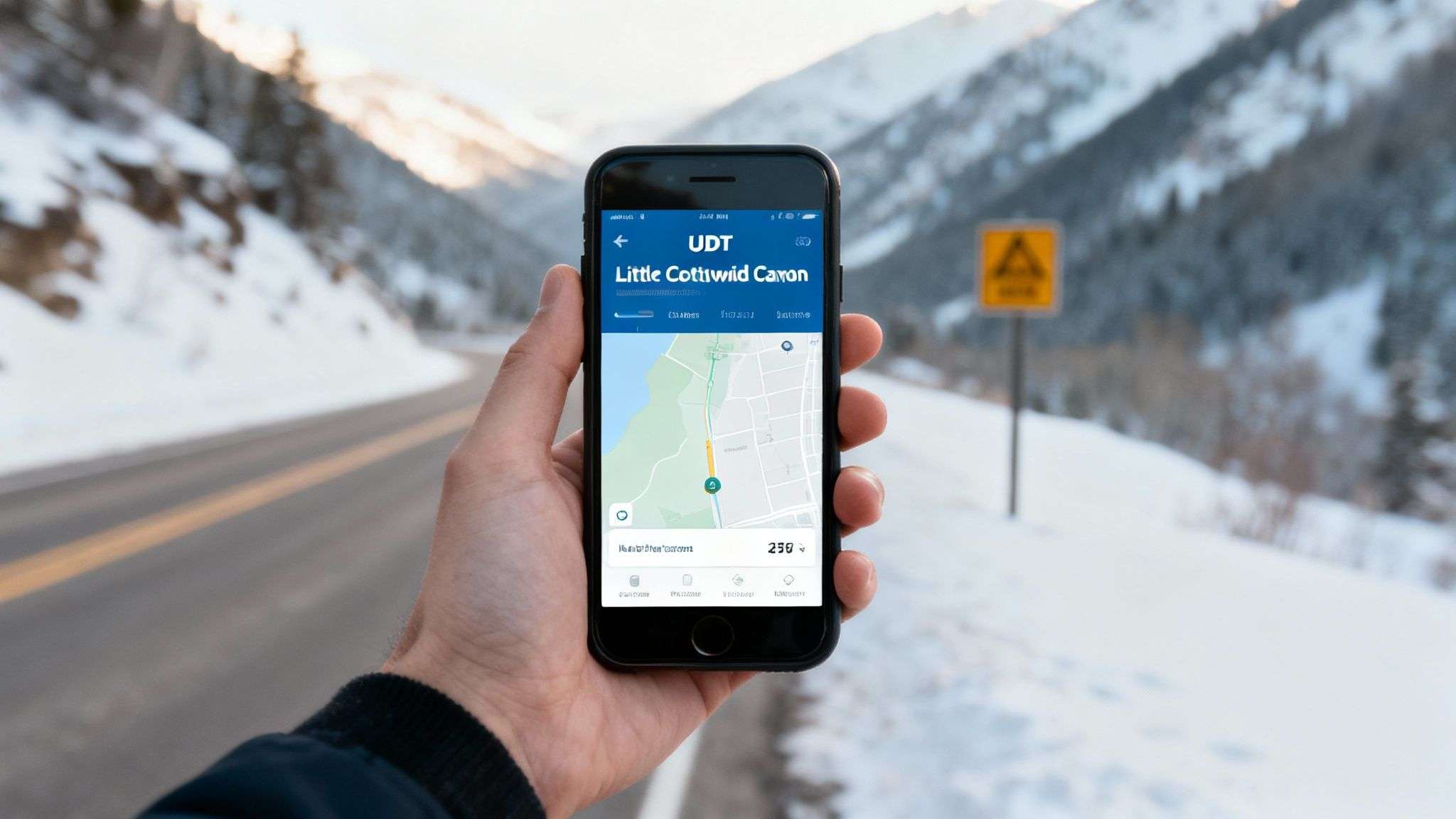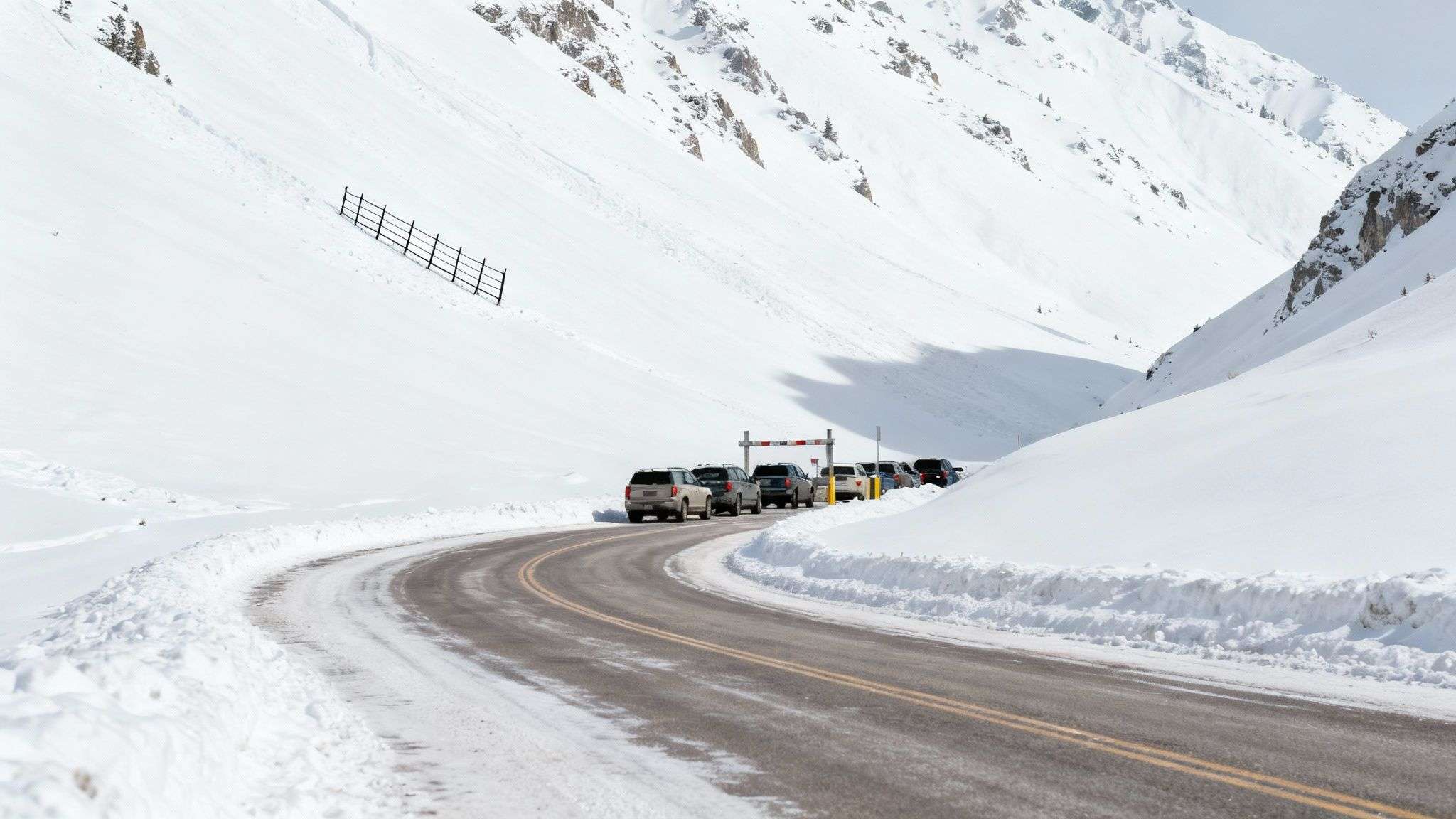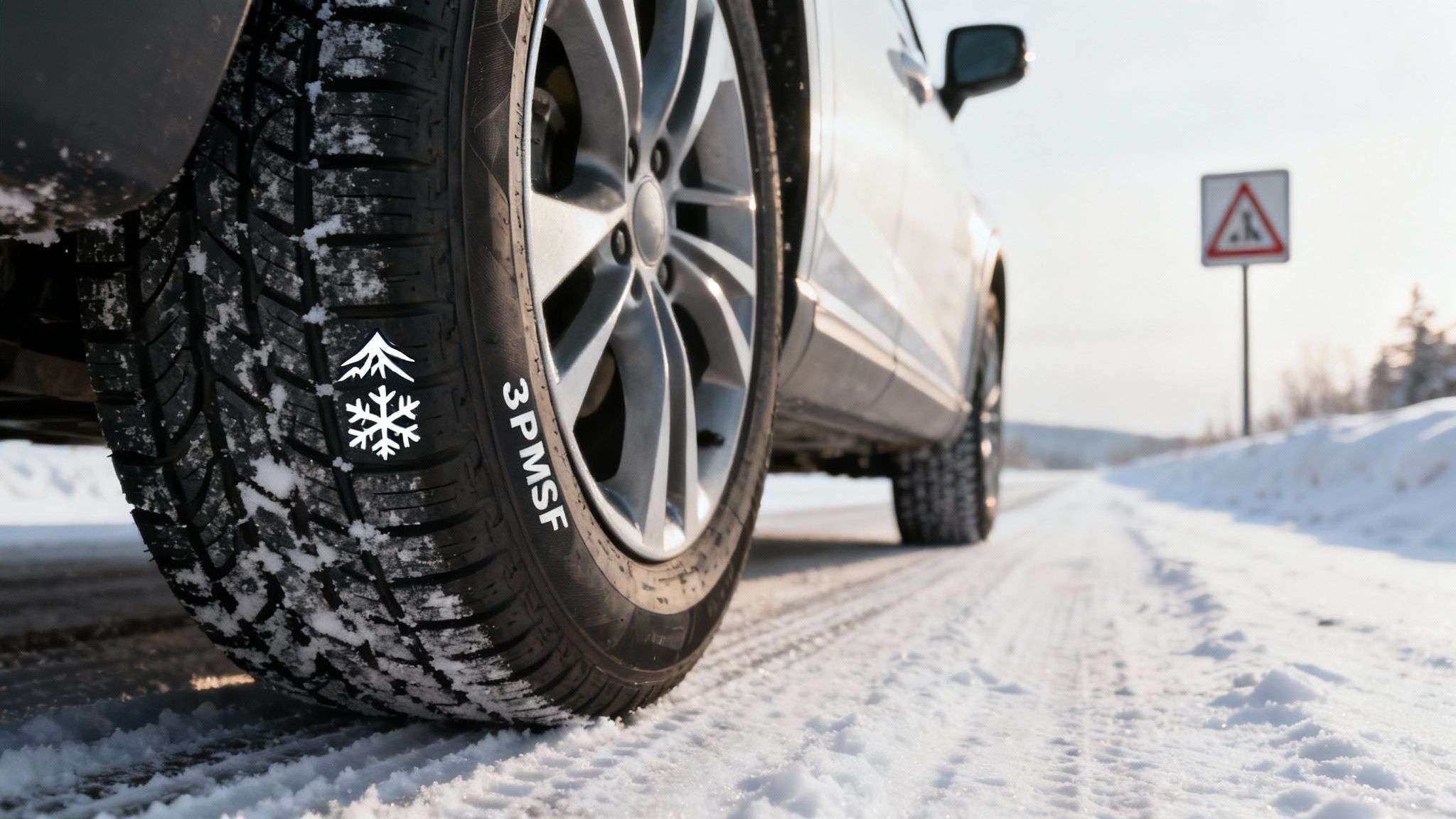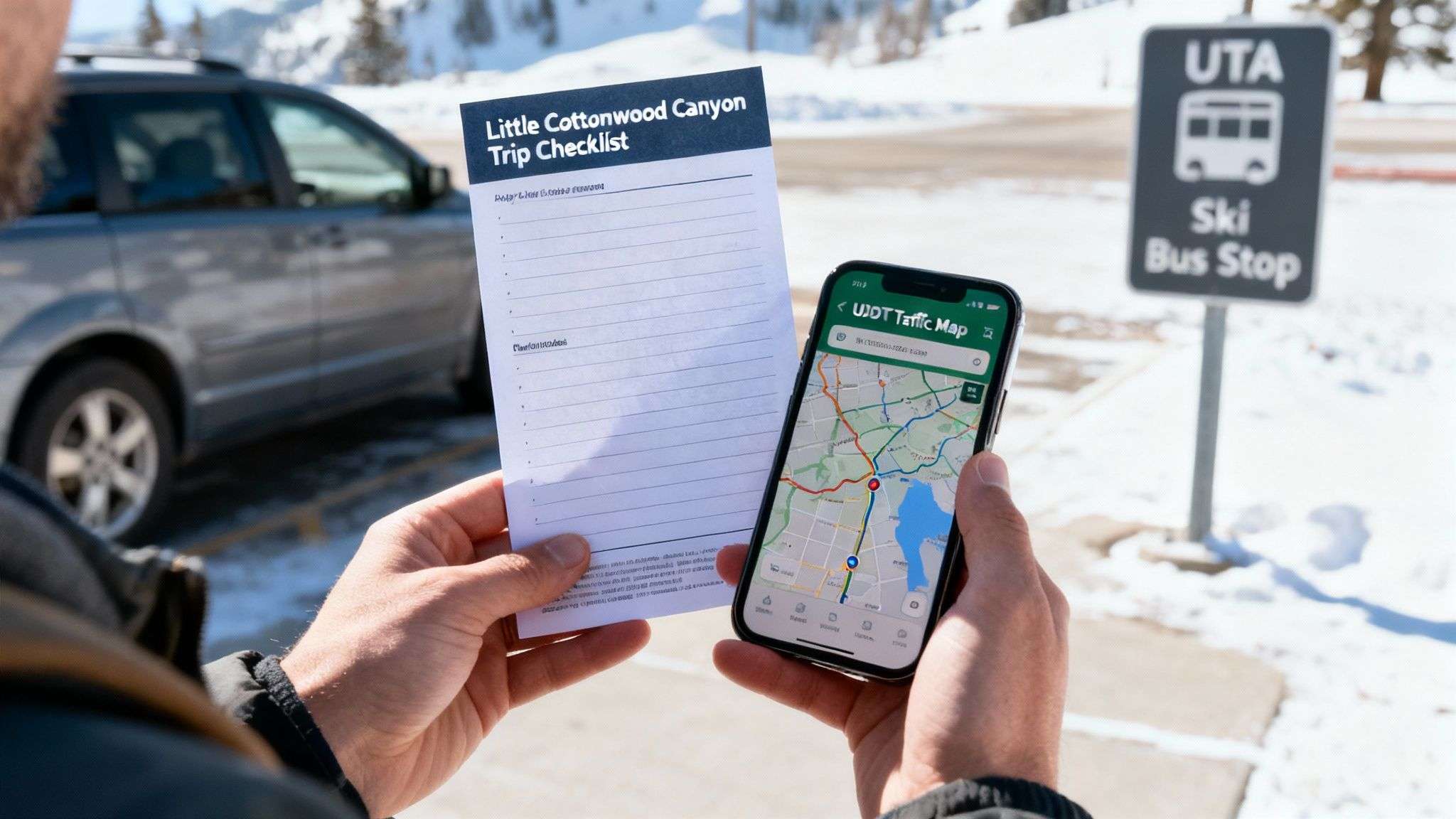How to Read the Little Cottonwood Canyon Road Report
Confused by the Little Cottonwood Canyon road report? Learn what UDOT alerts like 'Traction Law' and 'Avalanche Control' really mean for your trip to Alta or Snowbird.
Heading to Alta or Snowbird? Knowing how to read the official Little Cottonwood Canyon road report is the most critical step for a safe trip. This guide translates the common alerts from the Utah Department of Transportation (UDOT), explaining what terms like "Traction Law" and "Avalanche Control" mean for you and your vehicle.
What is the Little Cottonwood Canyon Road Report?
The Little Cottonwood Canyon (LCC) road report is your real-time guide to safely navigating State Route 210, one of North America’s most avalanche-prone roads. Issued by the Utah Department of Transportation (UDOT), this report provides live updates on road status, traction requirements, and closures. Ignoring it can lead to long delays, fines, or accidents.

The report tells you:
- Current Road Status: Is the road open, closed for avalanche control, or restricted?
- Traction Law Enforcement: Are snow tires or chains legally required right now?
- Incidents and Accidents: Are there spinouts or crashes causing delays?
- Estimated Reopening Times: If the road is closed, UDOT provides its best estimate for reopening.
This information helps you decide whether to leave early, take the UTA Ski Bus, or change your plans to avoid getting stuck.
Common LCC Road Statuses Explained
| Status or Term | What It Means for You | Required Action |
|---|---|---|
| Open | The road is clear for all vehicles. | Proceed with caution. No special equipment is legally required. |
| Traction Law in Effect | The road is slick. Only 4WD/AWD with proper tires OR 2WD with chains are allowed. | Check your vehicle. If you don't meet the requirements, you will be turned around. |
| Chains Required | Conditions are extremely hazardous. Chains are mandatory for all vehicles. | Pull over safely and install your chains before proceeding. |
| Avalanche Control | The road is temporarily closed while crews mitigate avalanche risk. | Wait for UDOT to announce the reopening. Do not try to bypass the closure. |
| Road Closed | The road is impassable due to an accident, avalanche, or severe weather. | Find an alternate plan. Check for estimated reopening times. |
When and Where to Check the LCC Road Report
Check the road report multiple times: the night before, right before you leave, and again if conditions are changing. The canyon’s weather is notoriously unpredictable, and the road status can change in minutes.

The most reliable, up-to-the-minute sources are always official UDOT channels:
- The UDOT Traffic website and its Cottonwood Canyons page.
- The free UDOT Traffic mobile app.
- The @UDOTcottonwoods account on X (formerly Twitter) for instant alerts.
These channels provide live updates directly from the crews managing the road. Always trust official sources over secondhand information.
How to Prepare for LCC Road Conditions
Understanding the report is the first step; being prepared is the second. The alerts on the Little Cottonwood Canyon road report directly relate to your vehicle's readiness and your travel plan.
Meeting Traction Law Requirements
The Traction Law is the most common winter restriction. It means the road is slick, and vehicles must have adequate traction to proceed.
- 4WD/AWD Vehicles: Must have tires with either a 3-Peak Mountain Snowflake (3PMSF) or Mud and Snow (M+S) rating.
- 2WD Vehicles: Must have chains installed on the drive tires.

Local Tip: Law enforcement physically checks tires at the canyon entrance. A 4WD vehicle with bald tires will be turned away. For a complete breakdown, read our comprehensive Utah Traction Law guide.
Planning Your Drive to Avoid Traffic
The legendary LCC powder also creates legendary traffic. To avoid the worst gridlock, adjust your timing.
- Go Early: Arrive at the canyon entrance before 6:30 AM to beat the morning rush (7:00 AM - 9:30 AM).
- Go Late: Head up after 1:00 PM when the morning crowd has thinned out.

If the report shows heavy delays or a closure, consider taking the UTA Ski Bus. It’s a stress-free alternative that eliminates worries about parking, traffic, and traction laws. For more strategies, see our Little Cottonwood Canyon traffic guide.
What Does Interlodge Mean?
Interlodge is the most serious alert. It is a legal order requiring everyone in the Town of Alta and at Snowbird to stay indoors due to extreme avalanche danger. You cannot leave any building—not even to go to your car—until the order is lifted. This happens when crews are performing avalanche control with explosives, making the area unsafe.
FAQ: Little Cottonwood Canyon Road Report
Where do I find the most accurate LCC road report?
The single source of truth is always the Utah Department of Transportation (UDOT). Use the official UDOT Traffic website, the UDOT Traffic mobile app, or follow @UDOTcottonwoods on X for real-time, official information.
What's the difference between "Traction Law" and "Chains Required"?
The Traction Law allows properly equipped 4WD/AWD vehicles to proceed without chains, but requires chains on 2WD vehicles. Chains Required is a more severe restriction meaning all vehicles, including 4WD/AWD, must have chains installed to continue up the canyon.
Can I use Uber or Lyft to get to Alta or Snowbird in a storm?
Rideshare services are highly unreliable during LCC snowstorms. Most drivers do not have canyon-compliant vehicles and often cancel rides. The UTA Ski Bus is a much safer and more dependable alternative.
For the most current and comprehensive canyon travel data, trust Wasatch Travel Helper. We consolidate live road reports, weather forecasts, and traffic cameras to give you the clearest picture of your journey up Little and Big Cottonwood Canyons. Plan your next ski day with confidence at https://wasatchroads.com.